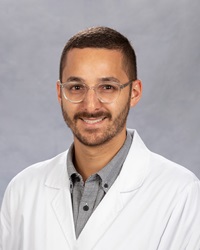Born out of the service gap to reach marginalized populations most affected by HIV and SUD during COVID-19, Drs. David Serota and Hansel Tookes’ Tele-Harm Reduction (THR) program is a telehealth-enhanced, harm reduction intervention, delivered within an SSP venue. It aims to facilitate initiation of care and achieve rapid HIV viral suppression among people who inject drugs (PWID) living with HIV while also overcoming stigma and meeting PWID where they are.
As a marginalized and stigmatized population since the beginning of the AIDS epidemic, PWID’s have not benefitted from the advent of antiretroviral therapy as others, and therefore have had suboptimal health outcomes in HIV patient care and have been disproportionately impacted by Hepatitis C and opioid use disorder (OUD). In addition, injection drug use has been linked to multiple outbreaks of new HIV cases in the U.S. since 2015. As the HIV professionals at the University of Miami strive to meet the Ending the HIV Epidemic (EHE) goal of a 90% reduction in HIV infections by 2030, Drs. Serota and Tookes understood the crucial role THR could play in the community.
In addition to implementing THR, Drs. Serota and Tookes pilot tested THR intervention to generate preliminary data on HIV outcomes at 6 months post study enrollment. Preliminary results between January 2020 and June 2020 showed 35 PWID living with HIV were enrolled in the THR pilot study with at least 6 months of follow up per participant. The majority were male (57.1%), experiencing unstable housing (59.4%), and injected heroin (77.1%), cocaine (37.1%), speedball (25.7%) or fentanyl (14.3%). Of participants, 25 (78.1%) were virally suppressed (i.e. HIV RNA <200) at six months, the end of the pilot period.



 t needle exchange program in Florida, the Infectious Diseases Elimination Act (IDEA Exchange) was signed into law in 2016 by Governor Scott. This program works to provide health equity by increasing access to the tools necessary to keep people healthy, especially those who are most vulnerable.
t needle exchange program in Florida, the Infectious Diseases Elimination Act (IDEA Exchange) was signed into law in 2016 by Governor Scott. This program works to provide health equity by increasing access to the tools necessary to keep people healthy, especially those who are most vulnerable.